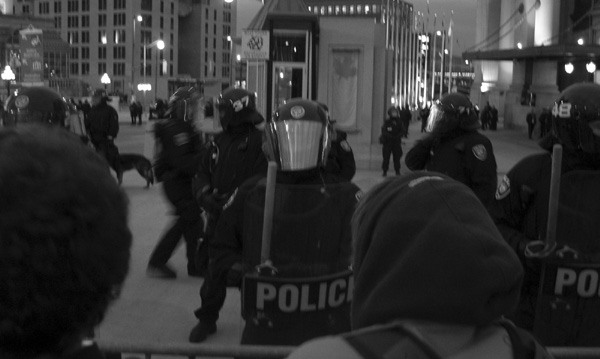I have been opposed to security certificates since I first became aware of them in 2002. In my opinion, security certificates represent a distillation of everything that is flawed with post-September 11 western responses to terrorism: they invoke national security imperatives to justify the differential treatment of citizens (us) and non-citizens (them); they raise the very real spectre of indefinite detention without charge or trial; they operate behind a veil of official secrecy; they make a mockery of due process and instead ask the public to place trust in the honesty and good intentions of the government and its national security agencies; they offer ‘named individuals’ the impossible choice between indefinite detention and ‘voluntary’ deportation to probable torture; and, by their very nature, they require the warping of the traditional (and already problematic) institutions of the Canadian criminal justice system.
This post is not about security certificates in general. For background the certificate mechanism, its many shortcomings, and the legal grey hole surrounding the Kingston Immigration Holding Centre (KIHC), check out this YCISS working paper (Incarcerating the ‘Inadmissible’) published with my colleague Justin Piché. See also the text of the Immigration and Refugee Protection Act (IRPA), the legislation covering security certificates, and the February 2007 ruling of the Supreme Court in the Charkaoui case. I also recommend the Justice for Mohamed Harkat page, which is effectively a clearing house for critical commentary and activism related to security certificates.
The remarks that follow relate to the current talking points of the Canadian Government in its support of security certificates and the new C-3 legislation. I suggest that we can understand the major themes or talking points of the government and other security certificate supporters as tactical components (language games) of a broader discourse (a strategic mode of power, following Foucault) that seeks to shape and circumscribe our understanding of contemporary security and politics. This (in)security discourse is inherently problematic. It reproduces the image of a post-September 11 ‘new normalcy’ where transnational terrorism is an ambiguous but omnipresent peril that acts as a fulcrum upon which democracies must balance security and liberty – a corrosive worldview that guarantees consequences and fails to deliver benefits.
Some quick background: Two Federal Government Ministers, operating on intelligence from the Canadian Security Intelligence Service (and other agencies), can sign a security certificate against a non-citizen deemed to be a threat to national security (among other reasons). The certificate is reviewed by a Federal Court judge. If upheld, it is considered conclusive proof of inadmissibility, and the named individual is detained pending deportation to their country of provenance. Since this is an administrative procedure and not a criminal justice procedure, there are no charges laid, and no trial. The individual is given only a brief summary of the evidence against them, but does not have the opportunity to challenge it in a court of law. In the post-September 11 context, five security certificates have been issued against Muslim men alleged to be involved in terrorist activity. The ‘Secret Trial Five’ have not been deported, as their countries of provenance – Algeria, Syria, Egypt – are known to practice torture on alleged terrorists (see the Maher Arar case for an example); to deport these men would place Canada in violation of the ‘non-refoulement’ clause in the United Nations Convention Against Torture (UNCAT). This has resulted in the long-term and indefinite detention of the named individuals, and / or the imposition of extremely strict bail conditions. In the February 2007 Charkaoui case, the Supreme Court found security certificates to violate that Charter on two main grounds. First, the secrecy of the proceedings violates the s. 7 right to life, liberty, and the security of person, and second, the prospect of indefinite detention without regular review violates the s. 9 protection against arbitrary imprisonment. The Court suspended the implication of its ruling until February 2008, in order to give the government a year to revise and ‘Charter-proof’ the security certificate mechanism. In late October of this year, the Conservative government tabled bill C-3, “An Act to amend the Immigration and Refugee Protection Act (certificate and special advocate) and to make a consequential amendment to another Act”, a piece of legislation that addresses the specific procedural fairness concerns of the Charkaoui Court in a bare-minimum fashion. C-3 leaves the fundamental underlying problems of the certificate mechanism unaddressed. It papers over these problems and attempts to give both legality and legitimacy to something (indefinite detention without trial and deportation to probable torture) that is, to use David Dyzenhaus’ words, ‘un-legalizable’.
In my next post, I will introduce and problematize five key talking points that emerge from the debates over C-3 - five maneuvers in a political process that is seeking to entrench security certificates in Canadian law.

No comments:
Post a Comment